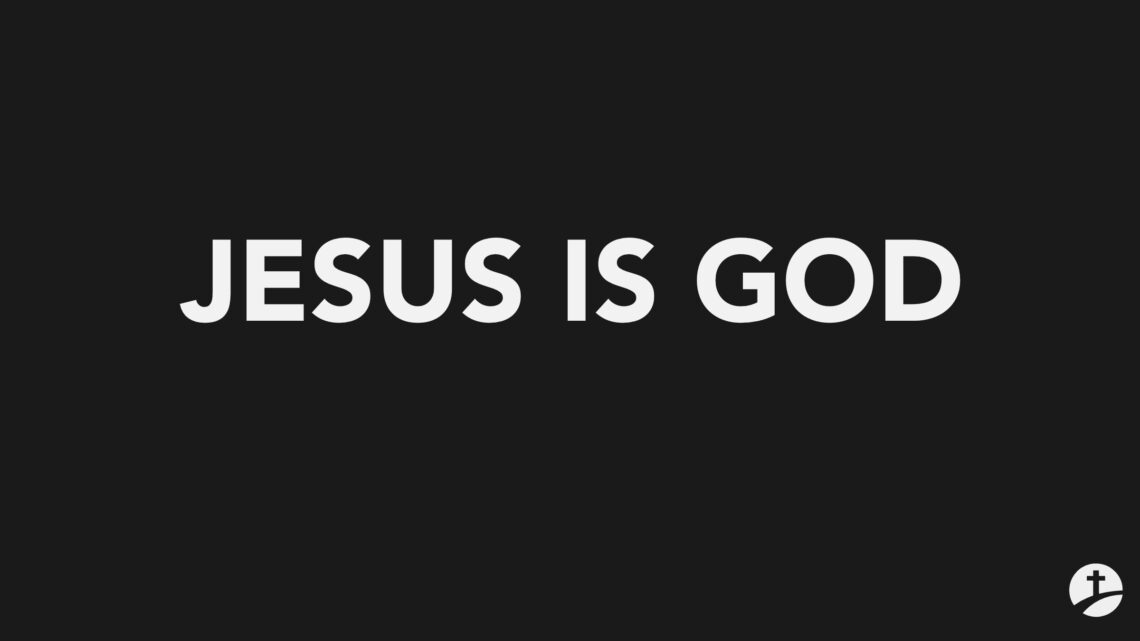Correcting false teachings on the nature of Jesus.
OBJECTION #1: WHY IS JESUS CALLED A “MAN” FROM HEAVEN IN 1 CORINTHIANS 15:48-49 AND NOT A “GOD” FROM HEAVEN?
1ST Response: Paul’s point in 1 Corinthians 15:48-49 in not Jesus’ divinity but His human nature and how by Him taking on flesh, we get His flesh at the resurrection, and no longer have to bare Adam’s flesh of death. Read the passage in it’s context-
The Resurrection Body
1 Corinthians 15:35-57 (NIV)
35 But someone will ask, “How are the dead raised? With what kind of body will they come?” 36 How foolish! What you sow does not come to life unless it dies. 37 When you sow, you do not plant the body that will be, but just a seed, perhaps of wheat or of something else. 38 But God gives it a body as he has determined, and to each kind of seed he gives its own body. 39 Not all flesh is the same: People have one kind of flesh, animals have another, birds another and fish another. 40 There are also heavenly bodies and there are earthly bodies; but the splendor of the heavenly bodies is one kind, and the splendor of the earthly bodies is another. 41 The sun has one kind of splendor, the moon another and the stars another; and star differs from star in splendor.
42 So will it be with the resurrection of the dead. The body that is sown is perishable, it is raised imperishable; 43 it is sown in dishonor, it is raised in glory; it is sown in weakness, it is raised in power; 44 it is sown a natural body, it is raised a spiritual body. If there is a natural body, there is also a spiritual body. 45 So it is written: “The first man Adam became a living being”; the last Adam, a life-giving spirit. 46 The spiritual did not come first, but the natural, and after that the spiritual. 47 The first man was of the dust of the earth; the second man is of heaven. 48 As was the earthly man, so are those who are of the earth; and as is the heavenly man, so also are those who are of heaven. 49 And just as we have borne the image of the earthly man, so shall we bear the image of the heavenly man.
50 I declare to you, brothers and sisters, that flesh and blood cannot inherit the kingdom of God, nor does the perishable inherit the imperishable. 51 Listen, I tell you a mystery: We will not all sleep, but we will all be changed — 52 in a flash, in the twinkling of an eye, at the last trumpet. For the trumpet will sound, the dead will be raised imperishable, and we will be changed. 53 For the perishable must clothe itself with the imperishable, and the mortal with immortality. 54 When the perishable has been clothed with the imperishable, and the mortal with immortality, then the saying that is written will come true: “Death has been swallowed up in victory.” 55 “Where, O death, is your victory? Where, O death, is your sting?”
56 The sting of death is sin, and the power of sin is the law. 57 But thanks be to God! He gives us the victory through our Lord Jesus Christ. 58 Therefore, my dear brothers and sisters, stand firm. Let nothing move you. Always give yourselves fully to the work of the Lord, because you know that your labor in the Lord is not in vain. [Isaiah 65:23]
2ND RESPONSE: Notice in the same passage Jesus is called “Lord” and we are commanded to “work for the Lord” because “work for the Lord is not in vain.” Paul is quoting from Isaiah 65:23 where the LORD’s (YHWH) people work for Him.
- 1 Corinthians 15:58, “Therefore, my dear brothers and sisters, stand firm. Let nothing move you. Always give yourselves fully to the work of the Lord, because you know that your labor in the Lord is not in vain.”
- Isaiah 65:23-24, “23 They will not labor in vain, nor will they bear children doomed to misfortune; for they will be a people blessed by the LORD, they and their descendants with them. 24 Before they call I will answer; while they are still speaking I will hear.”
3RD RESPONSE: Moreover Paul declares Jesus as Lord from start to finish in 1 Corinthians and in each context the title of Lord can only be referring to YHWH, the LORD of Israel.
- 1 Corinthians 1:2, “To the church of God in Corinth, to those sanctified in Christ Jesus and called to be his holy people, together with all those everywhere who call on the name of our Lord Jesus Christ—their Lord and ours.” & Joel 2:32, “And everyone who calls on the name of the LORD will be saved; for on Mount Zion and in Jerusalem there will be deliverance, as the LORD has said, even among the survivors whom the LORD calls.” [Romans 10:13]
- 1 Corinthians 1:9, “God is faithful, who has called you into fellowship with his Son, Jesus Christ our Lord.”
- 1 Corinthians 1:30-31, “30 It is because of him that you are in Christ Jesus, who has become for us wisdom from God—that is, our righteousness, holiness and redemption. 31 Therefore, as it is written: “Let the one who boasts boast in the Lord.” & Jeremiah 9:24, “but let the one who boasts boast about this: that they have the understanding to know me, that I am the LORD, who exercises kindness, justice and righteousness on earth, for in these I delight,” declares the LORD.
OBJECTION #2: IN JOHN 1:1c IT SHOULD READ, “THE WORD (aka, “JESUS”) IS A GOD,” NOT, “THE WORD WAS GOD.”
RESPONSE: The Greek grammar in John 1:1c is correctly translated “was God” and not “a god” because theos (God) is in the predicate nomitave and modifies the nature of the subject (“the Word”).
- ONENESS: “In the beginning was the Word, and the Word was with God [the Father], and the Word was God [the Father].”
- TRINITARIAN: “In the beginning was the Word, and the Word was with God [Father], and the Word was God [like the Father].”
- ARIANISM: “In the beginning was the Word, and the Word was with God [Father], and the Word was [a] god.”
- GREEK: (a) Ἐν ἀρχῇ ἦν ὁ λόγος, (b) καὶ ὁ λόγος ἦν πρὸς τὸν θεόν, (c) καὶ θεὸς ἦν ὁ λόγος.
- THEOS IN CLAUSE C IS A PREDICATE NOMINATIVE: A predicate nominative (also called a predicate noun) is a word or group of words that completes a linking verb and renames the subject.
- REBUTTING ONENESS: As can be seen in clause (c) “καὶ θεὸς ἦν ὁ λόγος,” there is no definite article before “θεὸς,” as is in the clause (b) “τὸν θεόν.” Therefore, “θεὸς” cannot be referring to a person and must be modifying the subject, “ὁ λόγος,” which has the article.
- REBUTTING ARIANISM: Because clause (c) is anarthrous, without the article, it is incorrect to add an “a” before it because “θεὸς” is not the subject, “ὁ λόγος” is, and thus since “θεὸς” comes before “ὁ λόγος” it acts as a modifier to the subject’s quality.
OBJECTION #3: JESUS IS A “GOD” LIKE HOW OTHERS IN THE BIBLE HAVE BEEN CALLED GODS, BUT THIS DOESN’T MEAN JESUS IS “YAHWEH GOD” (LORD GOD or the MOST HIGH GOD)
1ST RESPONSE: John 1:1-18 tells us exactly the “kind of God” Jesus is, He is the same kind of God as the Father
- Jesus is in the beginning before all creation (v. 1)
- Jesus created everything that has been created (v. 3)
- Jesus is the source of life and light in humanity (v. 4)
- Jesus is the only God the Jews have seen (v. 18)
More example of how Jesus is described with the same God-like attributes of the Father:
2ND RESPONSE: John in His gospel reveals exactly the kind of God Jesus said He was
(1) Isaiah saw Jesus’ glory and spoke about Him
- John 12:41, “Isaiah said this because he saw Jesus’ glory and spoke about him.”
- Isaiah 6:1-3, “1 In the year that King Uzziah died, I saw the Lord, high and exalted, seated on a throne; and the train of his robe filled the temple. 2 Above him were seraphim, each with six wings: With two wings they covered their faces, with two they covered their feet, and with two they were flying. 3 And they were calling to one another: “Holy, holy , holy is the LORD Almighty; the whole earth is full of his glory.”
(2) Abraham saw Jesus and rejoiced in Him
- John 8:56-59, “56 Your father Abraham rejoiced at the thought of seeing my day; he saw it and was glad.” 57 “You are not yet fifty years old,” they said to him, “and you have seen Abraham!” 58 “Very truly I tell you,” Jesus answered, “before Abraham was born, I am!” 59 At this, they picked up stones to stone him, but Jesus hid himself, slipping away from the temple grounds.”
- Genesis 18:1-2, “1 The LORD appeared to Abraham near the great trees of Mamre while he was sitting at the entrance to his tent in the heat of the day. 2 Abraham looked up and saw three men standing nearby. When he saw them, he hurried from the entrance of his tent to meet them and bowed low to the ground.”
3RD RESPONSE: The Bible is clear that though people, idols, or angles might be called “gods” there is only really one God.
- 1 Corinthians 8:5-6, “5 For even if there are so-called gods, whether in heaven or on earth (as indeed there are many “gods” and many “lords”), 6 yet for us there is but one God, the Father, from whom all things came and for whom we live; and there is but one Lord, Jesus Christ, through whom all things came and through whom we live.”
Note: Though the New Testament writers generally refer to the Father as “God” and Jesus as “Lord” this doesn’t mean the Father is not also “Lord” or that Jesus is not also “God.” These two titles, “God” and “Lord” are taken from the Shema and are used to describe the divine nature of both the persons of the Father and Son. Deuteronomy 6:4-5, “4 Hear, O Israel: The LORD our God, the LORD is one. 5 Love the LORD your God with all your heart and with all your soul and with all your strength.”
OBJECTION #4: JESUS TRICKS PEOPLE BY TELLING THEM TO PRAY TO THE FATHER, WHEN HE REALLY ANSWERS THERE PRAYERS
RESPONSE: Jesus is not the Father, but works together with the Father and the Spirit to answer our prayers.
- John 14:13-14, “13 And I will do whatever you ask in my name, so that the Father may be glorified in the Son. 14 You may ask me for anything in my name, and I will do it.”
OBJECTION #5: JESUS COULDN’T RESURRECT HIMSELF
RESPONSE: Jesus, along with the Father and Spirit, raised Himself from the dead.
- John 2:19-21, “19 Jesus answered them, “Destroy this temple, and I will raise it again in three days.” 20 They replied, “It has taken forty-six years to build this temple, and you are going to raise it in three days?” 21 But the temple he had spoken of was his body. 22 After he was raised from the dead, his disciples recalled what he had said. Then they believed the scripture and the words that Jesus had spoken.”
- John 10:17-18, “17 The reason my Father loves me is that I lay down my life —only to take it up again. 18 No one takes it from me, but I lay it down of my own accord. I have authority to lay it down and authority to take it up again. This command I received from my Father.”
OBJECTION #6: JESUS CANNOT BE GOD BECAUSE HE WAS GIVEN AUTHORITY FROM THE FATHER AND IN THE TRINITY THERE IS A HIERARCHY
1ST RESPONSE: Jesus, taking on flesh, is the reason why the Father must give Him everything. Adam was given authority as a man, and thus when Jesus became a man, on behalf of humanity, He was given it back because of His work on the cross as the perfect sacrifice.
- Philippians 2:5-11, “5 In your relationships with one another, have the same mindset as Christ Jesus: 6 Who, being in very nature God, did not consider equality with God something to be used to his own advantage; 7 rather, he made himself nothing by taking the very nature of a servant, being made in human likeness. 8 And being found in appearance as a man, he humbled himself by becoming obedient to death — even death on a cross! 9 Therefore God exalted him to the highest place and gave him the name that is above every name, 10 that at the name of Jesus every knee should bow, in heaven and on earth and under the earth, 11 and every tongue acknowledge that Jesus Christ is Lord, to the glory of God the Father.”
- Hebrews 2:14-17, “14 Since the children have flesh and blood, he too shared in their humanity so that by his death he might break the power of him who holds the power of death—that is, the devil — 15 and free those who all their lives were held in slavery by their fear of death. 16 For surely it is not angels he helps, but Abraham’s descendants. 17 For this reason he had to be made like them, fully human in every way, in order that he might become a merciful and faithful high priest in service to God, and that he might make atonement for the sins of the people.”
2ND RESPONSE: Just because there is order and a hierarchy in the Trinity doesn’t mean the persons of the Father, Son, and Holy Spirit have a different nature. God made humanity male and female in His image and gave us a hierarchy in the family but this doesn’t mean fathers, mothers, and children each have a different nature. Roles do not have anything to do with nature. People, just like with the Persons in the Trinity, can have different roles bu the same nature.
- Genesis 1:27, “So God created mankind in his own image, in the image of God he created them; male and female he created them.”
- Matthew 28:19, “Therefore go and make disciples of all nations, baptizing them in the name of the Father and of the Son and of the Holy Spirit…”
- Revelation 22:1, “Then the angel showed me the river of the water of life, as clear as crystal, flowing from the throne of God and of the Lamb…”
OBJECTION #7: JESUS IS ONE WITH THE FATHER AS DISCIPLES ARE ONE WITH THE FATHER AND SON, SO THIS WOULD MEAN HUMANS ARE IN THE TRINITY.
RESPONSE: Nowhere in John chapters 10 or 17 does it say disciples are one with the Father and Son. It says the disciples are one with each other as the Father and Son are one with each other. And the disciples are in Jesus as Jesus is in the Father.
- John 10:29-30, “29 My Father, who has given them to me, is greater than all; no one can snatch them out of my Father’s hand. 30 I and the Father are one.”
- John 17:1-26, “1 After Jesus said this, he looked toward heaven and prayed: “Father, the hour has come. Glorify your Son, that your Son may glorify you. 2 For you granted him authority over all people that he might give eternal life to all those you have given him. 3 Now this is eternal life: that they know you, the only true God, and Jesus Christ, whom you have sent. 4 I have brought you glory on earth by finishing the work you gave me to do. 5 And now, Father, glorify me in your presence with the glory I had with you before the world began.6 “I have revealed you to those whom you gave me out of the world. They were yours; you gave them to me and they have obeyed your word. 7 Now they know that everything you have given me comes from you. 8 For I gave them the words you gave me and they accepted them. They knew with certainty that I came from you, and they believed that you sent me.
- 9 I pray for them. I am not praying for the world, but for those you have given me, for they are yours. 10 All I have is yours, and all you have is mine. And glory has come to me through them. 11 I will remain in the world no longer, but they are still in the world, and I am coming to you. Holy Father, protect them by the power of your name, the name you gave me, so that they may be one as we are one. 12 While I was with them, I protected them and kept them safe by that name you gave me. None has been lost except the one doomed to destruction so that Scripture would be fulfilled.13 “I am coming to you now, but I say these things while I am still in the world, so that they may have the full measure of my joy within them. 14 I have given them your word and the world has hated them, for they are not of the world any more than I am of the world. 15 My prayer is not that you take them out of the world but that you protect them from the evil one. 16 They are not of the world, even as I am not of it. 17 Sanctify them by the truth; your word is truth. 18 As you sent me into the world, I have sent them into the world. 19 For them I sanctify myself, that they too may be truly sanctified.
- 20 “My prayer is not for them alone. I pray also for those who will believe in me through their message, 21 that all of them may be one, Father, just as you are in me and I am in you. May they also be in us so that the world may believe that you have sent me. 22 I have given them the glory that you gave me, that they may be one as we are one — 23 I in them and you in me—so that they may be brought to complete unity. Then the world will know that you sent me and have loved them even as you have loved me.
- 24 “Father, I want those you have given me to be with me where I am, and to see my glory, the glory you have given me because you loved me before the creation of the world. 25 “Righteous Father, though the world does not know you, I know you, and they know that you have sent me. 26 I have made you known to them, and will continue to make you known in order that the love you have for me may be in them and that I myself may be in them.”
OBJECTION #8: JESUS NEVER CALLS HIMSELF GOD, HE ONLY CALLS THE FATHER GOD SO THAT MEANS HE IS NOT GOD.
1st RESPONSE: Jesus called Himself God all the time in the Old Testament and multiple times in the New Testament used the divine name of God for Himself, likewise the Father calls Jesus God
- Isaiah 44:6, “This is what the LORD says— Israel’s King and Redeemer, the LORD Almighty: I am the first and I am the last; apart from me there is no God.” [Revelation 1:17-18]
- Isaiah 45:22-24, “22 Turn to me and be saved, all you ends of the earth; for I am God, and there is no other. 23 By myself I have sworn, my mouth has uttered in all integrity a word that will not be revoked: Before me every knee will bow; by me every tongue will swear. 24 They will say of me, ‘In the LORD alone are deliverance and strength.’” All who have raged against him will come to him and be put to shame.” [Philippians 2:10-11]
- John 13:19, “I am telling you now before it happens, so that when it does happen you will believe that I am who I am.” [Isaiah 43:10]
- Hebrews 1:8-9, “8 But about the Son he says, “Your throne, O God, will last for ever and ever; a scepter of justice will be the scepter of your kingdom. 9 You have loved righteousness and hated wickedness; therefore God, your God, has set you above your companions by anointing you with the oil of joy.”
2ND RESPONSE: Jesus incarnation and earthly ministry was not about Him declaring Himself to be God, but rather die on the cross for our sins.
- Luke 19:10, “For the Son of Man came to seek and to save the lost.”
- John 3:16-17, “16 For God so loved the world that he gave his one and only Son, that whoever believes in him shall not perish but have eternal life. 17 For God did not send his Son into the world to condemn the world, but to save the world through him.”
3RD RESPONSE: Jesus did things that only God could do
- Forgive sins, Mark 2:10
- Be called God, John 20:28
- Receive worship, Matthew 28:17
- Declared Himself to be the Good Shepherd, John 10:11
- Ratify and fulfill the Old Testament, Matthew 12:8
4TH RESPONSE: Jesus is called God in the Scriptures by the disciples and prophets
- Isaiah 9:6, “For to us a child is born, to us a son is given, and the government will be on his shoulders. And he will be called Wonderful Counselor, Mighty God, Everlasting Father, Prince of Peace.”
- Colossians 1:19, “For God was pleased to have all his fullness dwell in him…”
- 1 Timothy 3:16 (KJV), “God was manifest in the flesh, justified in the Spirit, seen of angels, preached unto the Gentiles, believed on in the world, received up into glory.”
- Titus 2:13, “While we wait for the blessed hope—the appearing of the glory of our great God and Savior, Jesus Christ…”
- 1 Peter 1:1, “To those who through the righteousness of our God and Savior Jesus Christ…”










